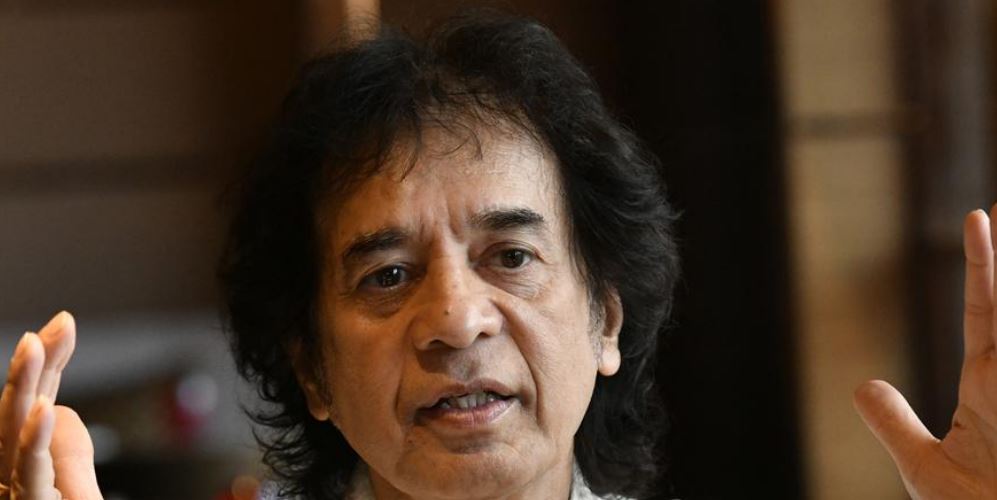The music world mourns the loss of Zakir Hussain, a legendary tabla virtuoso and one of India’s most celebrated musicians, who passed away at 73, his family said on Monday (December 16, 2024). Hussain died due to complications arising out of idiopathic pulmonary fibrosis, according to his family. The maestro had been battling heart-related issues for some time and breathed his last on Friday. Hussain’s death marks the end of an era, as he leaves behind a monumental legacy that transcends borders, cultures, and generations.
Known for his prodigious talent and career spanned over five decades, Zakir Hussain redefined the art of tabla playing, blending traditional Indian classical rhythms with contemporary global music. His contribution to music was unparalleled, and his legacy as a cultural ambassador of India will live on forever.
Known for his profound contribution to Indian classical music, Hussain had been battling heart-related issues in recent years. A family man, he is survived by his wife, Antonia Minnecola, and their two daughters. His family was his anchor, providing him with unwavering support throughout his illustrious career.
Condolence messages started floating across social media in remembrance of Zakir Hussain and his dedication to his music. The famous Bengali Actress, Social Entrepreneur, and the local councilor, Ananya Banerjee said in her social media post,
” The world mourns the silence of a tabla that once spoke to the soul.”
The world mourns the silence of a tabla that once spoke to the soul.#RestInPeace #ustadzakirhussain pic.twitter.com/aLpu5xK6W0
— Ananya Banerjee (@Ananya_1O9) December 15, 2024
Zakir Hussain: A Musical Prodigy
Zakir Hussain was born in Mumbai, India, on March 9, 1951, into a family steeped in musical tradition. He was the son of legendary tabla player Ustad Alla Rakha, who served as his first guru and lifelong inspiration. From a young age, it was evident that Hussain had inherited not only his father’s talent but also his passion and discipline for music.
By the age of 7, Hussain was already performing, and by 12, he had established himself as a child prodigy in the Indian classical music scene. His rigorous training under his father, combined with his natural flair for rhythm, set him apart as a rising star in the world of percussion.
Zakir Hussain’s professional career took off while he was still a teenager. He made his debut at the age of 12 and quickly gained recognition for his virtuosity. By the time he was in his early twenties, Zakir had already established himself as a leading figure in the world of tabla. His performances were marked by an extraordinary sense of rhythm, creativity, and a unique ability to blend traditional Indian rhythms with contemporary music styles.
The south Indian actor, director, writer and producer Kamal Hassan also paid condolences to the departed soul on his social media platform account X, formerly Twitter saying,
“Zakir Bhai ! He left too soon. Yet we are grateful for the times he gave us and what he left behind in the form of his art. Goodbye and Thank you.”
Zakir Bhai ! He left too soon. Yet we are grateful for the times he gave us and what he left behind in the form of his art.
Goodbye and Thank you.#ZakirHussain pic.twitter.com/ln1cmID5LV— Kamal Haasan (@ikamalhaasan) December 16, 2024
Achievements and Global Impact
-
International Recognition: Zakir Hussain’s journey from India to the global stage began in the 1970s when he moved to the United States. There, he joined forces with musicians from different backgrounds, notably George Harrison, Mickey Hart of the Grateful Dead, and John McLaughlin in the band Shakti. This fusion band became a landmark in world music, blending Indian classical music with jazz, leading to the creation of a new musical genre.
-
Awards and Honors: Over his illustrious career, Zakir received numerous accolades. He was awarded the Padma Shri in 1988 and the Padma Bhushan in 2002, two of India’s highest civilian honors. Internationally, he won five Grammy Awards, including those for Best World Music Album for “Planet Drum” and “Global Drum Project” with Mickey Hart. His contributions were also recognized with the Sangeet Natak Akademi Award in 1990.
-
Educational Contributions: Beyond performing, Zakir was deeply committed to education. He taught at the Ali Akbar College of Music in San Rafael, California, and conducted workshops worldwide, spreading the knowledge and appreciation of Indian classical music. His efforts in teaching and mentorship helped cultivate a new generation of musicians in both India and abroad.
-
Collaborations: Zakir’s versatility was unparalleled; he collaborated with artists across genres, from jazz to classical, pop to world music. His ability to adapt and innovate while staying true to the roots of Indian classical music made him a beloved figure in the international music community. Notable collaborations include those with violinist L. Shankar, jazz pianist Béla Fleck, and the Kronos Quartet.
Legacy and Last Days
In his later years, Zakir Hussain continued to perform, but his health, particularly heart-related issues, began to limit his activities. Despite these challenges, he never stopped innovating, working on new projects, and mentoring students. His last significant public performance was at the Mumbai Music Festival in 2023, where he received a standing ovation for his performance which was described as “transcendent.”
Zakir Hussain’s legacy is not confined to his recordings or performances; it lives in the countless musicians he inspired, the fusion of musical cultures he helped create, and the respect he garnered across the globe. His approach to music, combining deep traditional knowledge with an adventurous spirit, set a standard for what it means to be a musician in the modern world.

